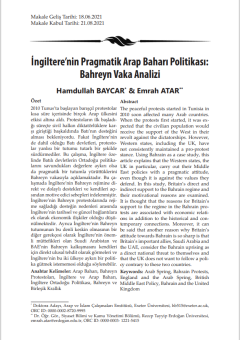The peaceful protests started in Tunisia in 2010 soon affected many Arab countries. When the protests first started, it was expected that the civilian population would receive the support of the West in their revolt against the dictatorships. However, Western states, including the UK, have not consistently maintained a pro-protest stance. Using Bahrain as a case study, this article explains that the Western states, the UK in particular, carry out their Middle East policies with a pragmatic attitude, even though it is against the values they defend. In this study, Britain’s direct and indirect support to the Bahrain regime and their motivational reasons are examined. It is thought that the reasons for Britain’s support to the regime in the Bahrain protests are associated with economic relations in addition to the historical and contemporary connections. Moreover, it can be said that another reason why Britain’s attitude towards Bahrain is so sharp is that Britain’s important allies, Saudi Arabia and the UAE, consider the Bahrain uprising as a direct national threat to themselves and that the UK does not want to follow a policy contrary to these two countries.





